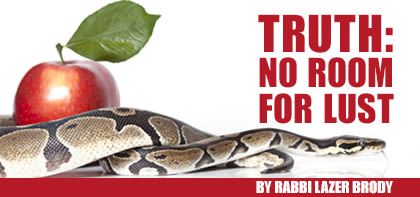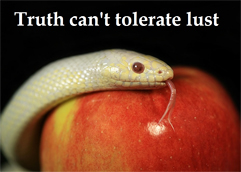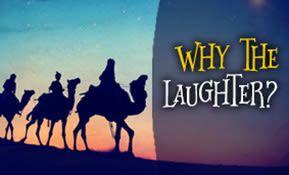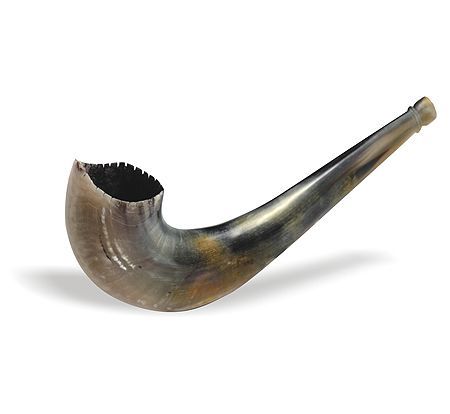
Shmini: Truth – No Room for Lust
It's all the same template – first decide what you want, then build an ideology that accommodates your lust. Yet, that doesn't mean that it's true…

"And you shall be holy…and you shall not defile your souls (Leviticus 11:41).
When concluding the commandments pertaining to the kashrut of animals, Hashem commands us to be holy. In the same passage, Hashem also warns us to be careful and not to defile our souls. Hashem is seemingly saying the same thing, but at a closer look, it's not. A person can refrain from defiling his soul with spiritually impure foods, especially meat that isn't from a kosher animal or from a kosher animal that hasn't been slaughtered and prepared exactly according to religious law, but that doesn't make him holy. He therefore must avoid the negative and act according to the positive. King David said this explicitly – "Turn away from the bad and do good"[1]. The juxtaposition of Hashem's double directive of being holy while avoiding defiling our souls comes to teach us that strict adherence to Jewish dietary laws is a prerequisite for holiness. It's not sufficient to have a righteous heart; one must protect that heart from becoming contaminated.
Our sages teach us that the foods we ingest become not only an integral part of our bodies but an integral part of our souls as well. The protein from the meat becomes part of our muscles. In like manner, the animal's soul[2] becomes part of our soul. The Kabbalists explain that a person internalizes the attributes of the food he or she eats. Simply speaking, one who consumes pork ends up acting like a pig. One who eats the blood of an animal attains bloodthirsty tendencies.
The food we eat doesn't give us holiness; eating kosher meat prevents a person from defiling himself, but  once again, that's only half the battle, the "turning away from the bad" as King David says. What, therefore, is "doing the good" when it comes to eating?
once again, that's only half the battle, the "turning away from the bad" as King David says. What, therefore, is "doing the good" when it comes to eating?
Holiness in eating is not only what we eat but how we eat. Rebb Nachman of Breslev says that a person who is entrenched in lust for food is far away from the truth and stern judgments hover over him.[3] How can Rebbe Nachman make such a statement? Just because a person has another glass of coke or another slice of pizza, he's far away from the truth?
In Parshat Mishpatim, the Torah warns us to stay far away from lies[4]. In the very next passage, the Torah says, "You shall not take a bribe for bribes blind the wise and distort the words of the righteous."[5] The Torah is telling us that a righteous and wise person can no longer have objective and truthful opinions or speech as soon as he is bribed.
Who takes bribes nowadays? Everyone does. If a person's bodily lusts override his judgment, he is bribed. He or she will do what the body dictates and not what's good for the soul. We all succumb to this subconsciously all the time if we aren't extremely careful in resisting lust and doing our best to rid ourselves of lust. Here's how:
Suppose a person craves chocolate. Someone offers him an irresistible bar of the best Swiss milk chocolate, but it doesn't have a kosher certification. The chocolate lover says to himself, "What's the big deal? What could possibly be wrong with chocolate? It isn't meat…" The chocolate contains milk powder that isn't kosher as well as additives that are derived from non-kosher sources. That doesn't interest the chocolate lover. He has already decided that he'll eat the chocolate; he now will build an ideology that enables him to partake of it, guild-free. The "bribe" of the chocolate has distorted his judgment and distanced him far away from the truth.
People do the same thing with all their lusts. Since the Torah doesn't allow them to do what they want, they build new ideologies that are compatible with their lust. A woman allows herself to wear a short skirt or a short-sleeved blouse by calling herself "modern orthodox". A man drives to the golf course on Saturday afternoon by calling himself "conservative". A college student dates a non-Jewish person by calling himself "reform". It's all the same template – first decide what you want, then build an ideology that accommodates your lust. Yet, that doesn't mean that it's true…
Truth doesn't tolerate lust. So how do we rid ourselves of lust? My esteemed and beloved teacher Rabbi Shalom Arush shlit'a says that if a person prays for 30 minutes a day to rid him/herself of lust, ee or she will experience great miracles within ninety days. Try it – it really works!
[1] Psalm 34:15
[2] The Ariza'l explains that each of the four levels of creation – mineral, plant, animal and human – all have souls; otherwise, they cannot exist.
[3] Likutei Moharan I:47
[4] Exodus 23:7
[5] Ibid, 8










Tell us what you think!
Thank you for your comment!
It will be published after approval by the Editor.